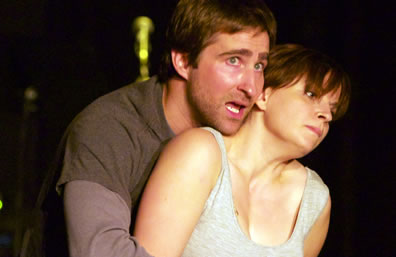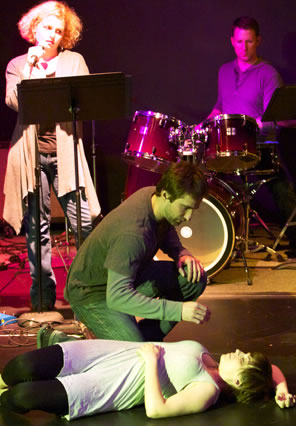The Rape of Lucrece
Taffety Punk Brings Out the Pain
In Shakespeare’s Poem
Taffety Punk Theatre Company, Capitol Hill Arts Workshop, Washington, D.C.
Thursday, September 27, 2012, Center of third row, box theater
Directed by Marcus Kyd

Tarquin (Joel David Santner) begins his assault of Lucrece (Kimberly Gilbert) in Taffety Punk's production of The Rape of Lucrece. Below, Tarquin approaches the sleeping Lucrece as the Narrator (Tonya Beckman) and drummer Dan Crane watch. Photos by Teresa Wood, Taffety Punk.
Shakespeare intended his plays to be acted, not read. He intended his poems and sonnets to be read, not acted. Still, his plays make such great literature they are worth reading, and his poems—the long-form narrative poems in particular—can make enticing theater. Besides, I'm guessing that if Shakespeare had been around for the Beat Movement, he would have tried his hand at it. Taffety Punk shows him the way. This is Shakespeare channeled through Ginsberg and Townshend.
Shakespeare wrote The Rape of Lucrece around 1594, his second narrative poem after Venus and Adonis, both composed while theaters were closed because of the plague. The story, dating to Ovid's and Livy's histories of Rome, starts with the Roman prince Tarquin hearing his close friend Collatine describe his wife, Lucrece. Inflamed by the account of Lucrece's beauty and grace, Tarquin steals to Collatium to seduce her. Finding her more beautiful and chaste than reputation held her and thereby failing to seduce her, Tarquin breaks into her bedchamber in the night and rapes her. He then flees, she fetches her husband home and upon telling him what happened, kills herself. Collatine has her body paraded through Rome, and the citizens, led by Lucius Junius Brutus, drive out the Tarquins and establish the Roman Republic (Brutus of Julius Caesar is a descendent of Lucius Junius).
The verse structure of The Rape of Lucrece is in seven-line iambic pentameter stanzas, ending in couplets following a never-varied rhyme scheme of ababbcc. Despite this formality and the long speeches it engenders (Lucrece, for example, spends 21 stanzas staring at a painting of the Trojan War), Shakespeare delves deep into human drive and emotions. Tarquin long debates the deed he intends to do, and we see the man's mind work through an ever-warping logic to what he sees as the only apt conclusion. Shakespeare vividly, and darkly, captures the nature of unfulfilled lust driving man to a sudden and violent ejaculation of passion that on the instant leaves him feeling empty. Lucrece is left to bear “the load of lust.” She engages in a long lament that dissolves into a search for some recourse, and we see the victim’s mind work through her confusion to the only light of honor she believes she can reach.
For Taffety Punk’s presentation, director Marcus Kyd presents all this through the aural prism of a three-piece rock combo. He plays guitar and speaks some of Tarquin's lines of conscience. Dan Crane plays drums and delivers Collatine's few lines. Kimberly Gilbert plays bass and Lucrece. In addition to her musical role, Gilbert carries the acting burden of the production along with Joel David Santner as Tarquin and Tonya Beckman as the Narrator, while Katie Murphy presents "Lucrece's Shadow" in dance choreographed by Erin Mitchell. For two key scenes, Tarquin and Lucrece's first meeting and the rape itself, Gilbert and Santner step to a space in front of the band to play out the action in formalized dance moves. The Trojan War with, in particular, the seduction of Helen also plays out front with Murphy dancing “the strumpet” Helen (i.e., Lucrece's self-reflection) and Santner's Tarquin filling in as Paris.
Beckman's Narrator in a leering tone and winking expression presents all this as a salacious tale-tell. She titillates us, and by our own human nature we begin to side with Tarquin, knowing that if he doesn't carry through with his determination, we won't get the payoff to this wicked story: kind of like watching a slasher flick. In this way, report makes us complicit in Lucrece's violation (she even points to this in her post-rape lament), and sharing in Tarquin's own subsequent sudden self-disgust does not make us any less responsible or reprehensible.
This is made more poignant by Gilbert's representation of Lucrece. Her innocence is entirely believable (especially the modesty she exhibits in the initial scene hosting Tarquin), her victimization is devastatingly apparent. Gilbert starts off the lament to a thundering soundtrack (with her bass providing the thunder of a distress she can't vent), rapping in anger and soon soaring into song, a wail of unremitting anguish, but tuneful still. The desolation at the end of this passage lingers through the silence (though some audience members felt they had to clap, some of us were too moved to move).
 The combo provides a subtle auralscape to the narration, adds sonic emphasis when needed, and rips into scorching rock at key points. Tarquin's break-in to Lucrece's chamber is concussive violence of Crane crashing on the toms, Gilbert humping her bass, and Kyd making Edgey emissions on guitar. The way the band shifts through gears and weaves around the narration reminds me of The Who working through Pete Townshend's live Lifehouse project.
The combo provides a subtle auralscape to the narration, adds sonic emphasis when needed, and rips into scorching rock at key points. Tarquin's break-in to Lucrece's chamber is concussive violence of Crane crashing on the toms, Gilbert humping her bass, and Kyd making Edgey emissions on guitar. The way the band shifts through gears and weaves around the narration reminds me of The Who working through Pete Townshend's live Lifehouse project.
The visuals are equally arresting. The rape is presented several times, each with the same choreography but different tones: the first is Tarquin's fantasy of the ultimate seduction, the second is his reality of the rape, the third is her reality of the rape, and subsequent versions represent her replaying the rape in her seared mind. The choreography is repeated again in Helen’s abduction in Lucrece’s meditation on the Trojan War mural. A key aspect of the rape is that Tarquin gives Lucrece a choice: she can submit, or he will force his way and then kill her, kill a slave, and dump the two bodies into a bed together and claim he found them thus and so killed them in disgust. Shakespeare doesn’t dwell on her decision, but later when she decides to kill herself, she notes with irony how the rape had occurred because she feared death. Taffety Punk's production pauses as Lucrece considers, the band watching her closely. She submits, and Beckman's Narrator seems somewhat surprised by Lucrece’s decision, as if she believed Lucrece should have opted for what some would call "legitimate rape."
The production makes a key choice in ending the play with Lucrece's death, 18 stanzas short of Shakespeare's original. We don't get the grief of Collatine and Lucrece’s father, nor Brutus launching Lucrece's revenge. Kyd and company instead leave us with the visceral effect of Lucrece's plight, not an intellectual response diffused through a social or political prism.
The Narrator and Tarquin occasionally use synthesizers to modulate their voices, which make their words indistinguishable. This was a demerit for me, but I recognize that what could legitimately be seen as an intellectual fault may have been an artistic choice to modulate Shakespeare's formal verse structure into an emotion, something felt and not really understood.
For Shakespeare fans, especially those of you who focus solely on his plays, I urge you to read The Rape of Lucrece. The way he manages humanness and emotional-laden themes in such a formal verse structure is genius. Taffety Punk turns that formal verse structure into emotion itself.
Eric Minton
October 2, 2012
Comment: e-mail editorial@shakespeareances.com
Start a discussion in the Bardroom



 Find additional Shakespeareances
Find additional Shakespeareances